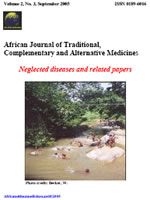
|
African Journal of Traditional, Complementary and Alternative Medicines
African Ethnomedicines Network
ISSN: 0189-6016
Vol. 14, No. 3, 2017, pp. 147-156
|
 Bioline Code: tc17091
Bioline Code: tc17091
Full paper language: English
Document type: Research Article
Document available free of charge
|
|
|
African Journal of Traditional, Complementary and Alternative Medicines, Vol. 14, No. 3, 2017, pp. 147-156
| en |
IN VITRO CHEMO-PREVENTATIVE ACTIVITY OF STRELITZIA NICOLAI  ARIL EXTRACT CONTAINING BILIRUBIN ARIL EXTRACT CONTAINING BILIRUBIN
Dwarka, Depika; Thaver, Veneesha; Naidu, Mickey; Koorbanally, Neil A. & Baijnath, Himansu
Abstract
Background: The discovery of the only animal pigment, bilirubin, in the plant Strelitzia nicolai has triggered a vast number of questions regarding bilirubin’s formation and its role in the human body. Recent studies have confirmed that
bilirubin at certain levels have many medical benefits. Various case studies have revealed that bilirubin is a potent
antioxidant. Cervical cancer is one of South Africa’s largest womens’ health crises. It is estimated that it affects one out
of 41 South African women and kills approximately 8 women in the country every day. Thus, the aim of this study was
to investigate if the aril extract of Strelitzia nicolai (Regel and Körn.) containing bilirubin possesses anti-cancer activity
and to determine its effect on the induction of apoptosis.
Materials and methods: The DPPH activity was firstly used to determine the antioxidant effect of the extract.
Thereafter, the cytotoxic effect was tested using the XTT assay. Apoptosis was confirmed and quantified using the
Annexin V-PE kit and the morphology was studied using acridine orange and ethidium bromide.
Results: The aril
extract decreased cell viability by 52% and induced apoptosis in HeLa cells; as shown by the Annexin V-PE Apoptosis
detection kit and morphological studies with acridine orange/ethidium bromide staining.
Conclusion: The activity of
the extract as a potent antioxidant was immensely enhanced as compared to the bilirubin standard. These results
suggest that S. nicolai aril extract containing bilirubin works synergistically as opposed to bilirubin on its own.
Furthermore, this extract might be a good candidate for the therapeutic intervention of cervical cancer.
Keywords
Bilirubin; Strelitzia nicolai; apoptosis; aril extract; antioxidant
|
| |
© Copyright 2017 - African Journal of Traditional, Complementary and Alternative Medicines
Alternative site location: http://journals.sfu.ca/africanem/index.php/ajtcam
|
|
